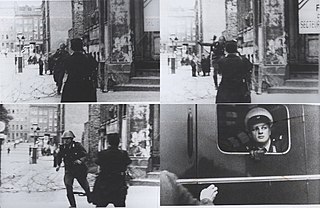Related Research Articles

The Republic of Ireland had a population of 5,149,139 at the 2022 census.

A refugee, conventionally speaking, is a person who has lost the protection of their country of origin and who cannot or is unwilling to return there due to well-founded fear of persecution. Such a person may be called an asylum seeker until granted refugee status by the contracting state or the United Nations High Commissioner for Refugees (UNHCR) if they formally make a claim for asylum.

The Home Office (HO), also known as the Home Department, is a ministerial department of the British Government, responsible for immigration, security, and law and order. As such, it is responsible for policing in England and Wales, fire and rescue services in England, visas and immigration, and the Security Service (MI5). It is also in charge of government policy on security-related issues such as drugs, counter-terrorism, and ID cards. It was formerly responsible for His Majesty's Prison Service and the National Probation Service, but these have been transferred to the Ministry of Justice.
An asylum seeker is a person who leaves their country of residence, enters another country and applies for asylum in that other country. An asylum seeker is an immigrant who is making a claim to have been forcibly displaced and might have fled their home country because of war or other factors harming them or their family. If their case is accepted, they become considered a refugee. The terms asylum seeker, refugee and illegal immigrant are often confused.
In international law, a stateless person is someone who is "not considered as a national by any state under the operation of its law". Some stateless people are also refugees. However, not all refugees are stateless, and many people who are stateless have never crossed an international border. At the end of 2022, the United Nations High Commissioner for Refugees estimated 4.4 million people worldwide as either stateless or of undetermined nationality, 90,800 more than at the end of 2021.
Since 1945, immigration to the United Kingdom, controlled by British immigration law and to an extent by British nationality law, has been significant, in particular from the Republic of Ireland and from the former British Empire, especially India, Bangladesh, Pakistan, the Caribbean, South Africa, Nigeria, Ghana, Kenya, and Hong Kong. Since the accession of the UK to the European Communities in the 1970s and the creation of the EU in the early 1990s, immigrants relocated from member states of the European Union, exercising one of the European Union's Four Freedoms. In 2021, since Brexit came into effect, previous EU citizenship's right to newly move to and reside in the UK on a permanent basis does not apply anymore. A smaller number have come as asylum seekers seeking protection as refugees under the United Nations 1951 Refugee Convention.

A British Overseas citizen (BOC) is a holder of a residual class of British nationality, largely held by people connected with former British colonies who do not have close ties to the United Kingdom or its remaining overseas territories. Individuals with this form of nationality are British nationals and Commonwealth citizens, but not British citizens. BOCs are subject to immigration control when entering the United Kingdom and do not have the automatic right of abode there or in any British overseas territory.

Immigration to Germany, both in the country's modern borders and the many political entities that preceded it, has occurred throughout the country's history. Today, Germany is one of the most popular destinations for immigrants in the world, with well over 1 million people moving there each year since 2013. As of 2019, around 13.7 million people living in Germany, or about 17% of the population, are first-generation immigrants.

Migration Watch UK is a British think-tank and campaign group which argues for lower immigration into the United Kingdom. Founded in 2001, the group believes that international migration places undue demand on limited resources and that the current level of immigration is not sustainable.

The United States recognizes the right of asylum for individuals seeking protections from persecution, as specified by international and federal law. People who seek protection while outside the U.S. are termed refugees, while people who seek protection from inside the U.S. are termed asylum seekers. Those who are granted asylum are termed asylees.
Family reunification is a recognized reason for immigration in many countries because of the presence of one or more family members in a certain country, therefore, enables the rest of the divided family or only specific members of the family to emigrate to that country as well.
Strangers into Citizens was a political advocacy campaign from around February 2007 to May 2010 by the then Citizen Organising Foundation, also known as the London Citizens organisation, now defunct, having been merged into the Citizens UK organisation as separate local chapters. The campaign called for irregular and extraordinary general amnesty, regularisation, naturalisation, and British citizenship for illegal immigrants in the United Kingdom. The campaign became defunct in 2013.
The Australian government has a policy and practice of detaining in immigration detention facilities non-citizens not holding a valid visa, suspected of visa violations, illegal entry or unauthorised arrival, and those subject to deportation and removal in immigration detention until a decision is made by the immigration authorities to grant a visa and release them into the community, or to repatriate them to their country of origin/passport. Persons in immigration detention may at any time opt to voluntarily leave Australia for their country of origin, or they may be deported or given a bridging or temporary visa. In 1992, Australia adopted a mandatory detention policy obliging the government to detain all persons entering or being in the country without a valid visa, while their claim to remain in Australia is processed and security and health checks undertaken. Also, at the same time, the law was changed to permit indefinite detention, from the previous limit of 273 days. The policy was instituted by the Keating government in 1992, and was varied by the subsequent Howard, Rudd, Gillard, Abbott, Turnbull, Morrison and Albanese Governments. The policy is regarded as controversial and has been criticised by a number of organisations. In 2004, the High Court of Australia confirmed the constitutionality of indefinite mandatory detention of non-citizens. However, this interpretation was overturned in a landmark decision in 2023, with the High Court concluding the practice was unlawful and unconstitutional.
The Gateway Protection Programme was a refugee resettlement scheme operated by the Government of the United Kingdom in partnership with the United Nations High Commissioner for Refugees (UNHCR) and co-funded by the European Union (EU), offering a legal route for a quota of UNHCR-identified refugees to be resettled in the UK. Following a proposal by the British Home Secretary, David Blunkett, in October 2001, the legal basis was established by the Nationality, Immigration and Asylum Act 2002 and the programme itself launched in March 2004. The programme enjoyed broad support from the UK's main political parties.
Language analysis for the determination of origin (LADO) is an instrument used in asylum cases to determine the national or ethnic origin of the asylum seeker, through an evaluation of their language profile. To this end, an interview with the asylum seeker is recorded and analysed. The analysis consists of an examination of the dialectologically relevant features in the speech of the asylum seeker. LADO is considered a type of speaker identification by forensic linguists. LADO analyses are usually made at the request of government immigration/asylum bureaux attempting to verify asylum claims, but may also be performed as part of the appeals process for claims which have been denied; they have frequently been the subject of appeals and litigation in several countries, e.g. Australia, the Netherlands and the UK.
United Kingdom immigration law is the law that relates to who may enter, work in and remain in the United Kingdom. There are many reasons as to why people may migrate; the three main reasons being seeking asylum, because their home countries have become dangerous, people migrating for economic reasons and people migrating to be reunited with family members.

The Migration Act 1958(Cth) is an Act of the Parliament of Australia that governs immigration to Australia. It set up Australia’s universal visa system (or entry permits). Its long title is "An Act relating to the entry into, and presence in, Australia of aliens, and the departure or deportation from Australia of aliens and certain other persons."

During 2015, there was a period of significantly increased movement of refugees and migrants into Europe. 1.3 million people came to the continent to request asylum, the most in a single year since World War II. They were mostly Syrians, but also included significant numbers from Afghanistan, Nigeria, Pakistan, Iraq, Eritrea, and the Balkans. The increase in asylum seekers has been attributed to factors such as the escalation of various wars in the Middle East and ISIL's territorial and military dominance in the region, as well as Lebanon, Jordan, and Egypt ceasing to accept Syrian asylum seekers.
The UK Home Office hostile environment policy is a set of administrative and legislative measures designed to make staying in the United Kingdom as difficult as possible for people without leave to remain, in the hope that they may "voluntarily leave". The Home Office policy was first announced in 2012 under the Conservative-Liberal Democrat coalition. The policy was widely seen as being part of a strategy of reducing UK immigration figures to the levels promised in the 2010 Conservative Party Election Manifesto.

The Nationality and Borders Act 2022 is an Act of the Parliament of the United Kingdom proposed in July 2021 relating to immigration, asylum and the UK's modern slavery response. The Act also deals with British overseas territories citizenship and registration of stateless citizens. Amongst other elements, it proposes to introduce "designated places" or "offshore" asylum hubs for application of refugee and migrant asylum claims, potentially in another European country or an African country. Part 5 of the Act grants the Government new powers to limit who is considered a victim of modern slavery, with clauses limiting support in cases where survivors have not complied with State-set deadlines to disclose their abuse. Under Part 5, decision makers would also be asked to consider the survivors' criminal history before deeming them eligible for support.
References
- 1 2 "Independent Asylum Commission". www.independentasylumcommission.org.uk. Retrieved 28 November 2017.
- 1 2 3 "The Independent Asylum Commission | Institute of Race Relations". www.irr.org.uk. Retrieved 28 November 2017.
- ↑ "WHAT IS THE INDEPENDENT ASYLUM COMMISSION?".
- ↑ "The Independent Asylum Commission". mbreckitttrust.org. Retrieved 28 November 2017.
- ↑ "Independent Asylum Commission".
- ↑ "BBC NEWS - UK - Asylum system 'shameful for UK'". 27 March 2008.
- ↑ "Convention relating to the Status of Refugees". 7 June 2012. Archived from the original on 7 June 2012. Retrieved 28 November 2017.
- ↑ "Independent Asylum Commission". www.citizensforsanctuary.org.uk. Retrieved 30 November 2017.
- ↑ "Fit For Purpose Yet?" (PDF). Independent Asylum Commission. 27 March 2008. Archived from the original (PDF) on 12 September 2019.
- ↑ garyc. "Independent Asylum Commission". webcache.googleusercontent.com. Retrieved 30 November 2017.
- ↑ "15/07/08: Independent Asylum Commission hails Scottish leadership on humane asylum policy | Scottish Refugee Council". www.scottishrefugeecouncil.org.uk. Retrieved 30 November 2017.
- ↑ "UNISON Scotland Independent Asylum Commission's Review of the UK Asylum System Response". www.unison-scotland.org.uk. Retrieved 5 December 2017.
- ↑ Green, Lord Andrew. "Migrationwatch response to report by Independent Asylum Commission". Migration Watch UK. Retrieved 5 December 2017.